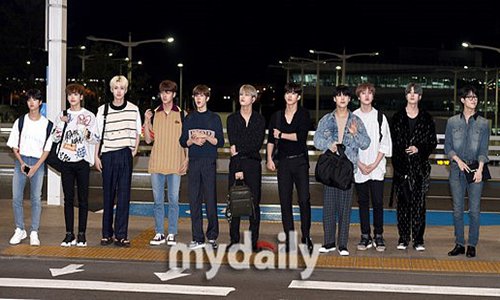HOME >> OPINION
K-pop strikes the right chord in East Asia
By Ding Gang Source:Global Times Published: 2019/10/9 19:48:40

South Korean pop group X1 take off from Seoul to take part in KCON 2019 THAILAND on September 27, 2019. Photo: VCG
Korean pop (K-pop), which found birth in South Korean culture, represents a symphony of various styles and genres of music. Observing how K-pop developed and thrived can help us reassess cooperation in East Asia.
K-pop witnessed rapid success in China, Japan and then spread to the whole of Asia since the beginning of the 21st century. It is now a remarkable cultural product with a huge share of the global pop culture market. Many countries across the world hold KCON, an annual K-pop convention, with tens of thousands of people taking part. The genre has also created tremendous commercial value. According to the Korea Creative Content Agency, K-pop spawns an industry worth $4.7 billion.
As most K-pop songs have a distinctive and modern style, they are popular among youngsters. Beyond national borders, K-pop resonates with the younger generation in Asia and has become a symbol of cultural integration.
Like an art factory, K-pop has made many bands a hit. One of them is WayV - mainly formed by Chinese singers, and GOT7 with members from many nations. GOT7 topped the list of the most popular K-pop idols in the US on the platform IDOLCHAMP in August.
While cultural exchange among the young in Asia is growing vigorously, what people read and watch on Chinese and South Korean mainstream media are mainly reports on regional politics, diplomacy and economy. Scholars are also concerned more about those issues. Such being the case, people might be pessimistic about the prospects of East Asian cooperation.
But cultural phenomena like K-pop are resonating among the young in East Asia and finding favor during cultural interaction. This can help solve problems.
Generally, we can learn from K-pop in three ways. First, we need to pay more attention to development and success of nongovernmental exchanges, through which we could glimpse the future. Take books written by Japanese writers popular among Chinese youth. In many book stores on the Chinese mainland, Japanese novels are often placed on the shelves of best sellers. If we cannot figure out why young people love such works, how can we perceive the development of bilateral relations between China and Japan?
Second, the success of K-pop has told us there are various ways to promote interactions and increase mutual trust. Members of the younger generation living in the globalized era have something in common in many fields. This has endowed us with possibilities to find new opportunities of cooperation.
Third, media should focus more on cultural exchanges than political, economic and diplomatic topics. Media outlets should have more reports on cultural activities like K-pop and offer their viewpoints on how to promote similar interactions, and thus attract more young audiences.
Improving cultural exchanges doesn't mean forgetting history but rather creating opportunities for talks. Dialogues and interactions can make the youth scrub off nationalist sentiments and embrace the future.
As we learn to perceive young people - understand what they want, what makes them sad and happy, and how they see each other - we will definitely find ways to increase trust.
Many K-pop songs are about love. One popular in Asia is titled "What is love?" This song has been sung in Chinese by Chinese pop star Lu Han and Kim Jong-dae, aka Chen, who is a member of K-pop band EXO. Its Korean version is presented by EXO members Doh Kyung-soo, aka D.O., and Byun Baek-hyun, aka Baekhyun.
The Chinese version of the song says, "the whole world is jealous of me for holding your hand." I would like to present these lyrics to all people who devote themselves to promoting cooperation in East Asia.
The author is a senior editor with People's Daily, and currently a senior fellow with the Chongyang Institute for Financial Studies at Renmin University of China. dinggang@globaltimes.com.cn. Follow him on Twitter @dinggangchina
Posted in: ASIAN REVIEW